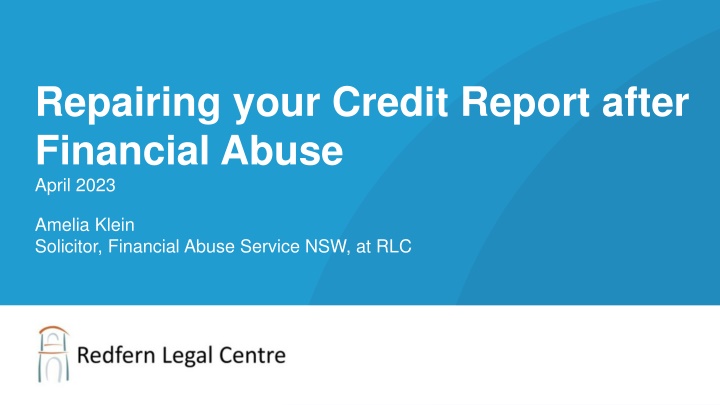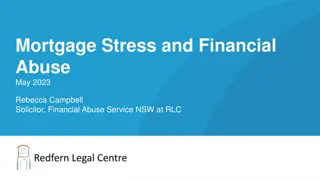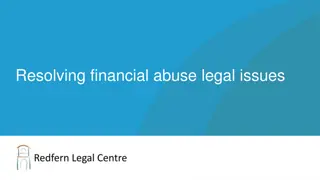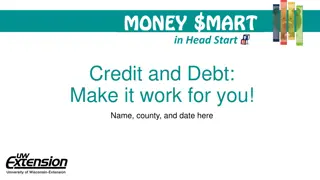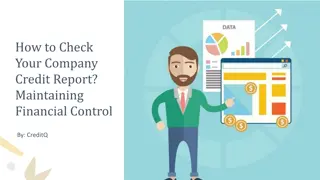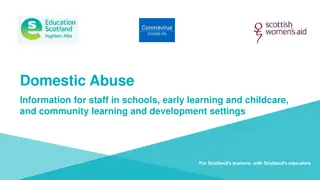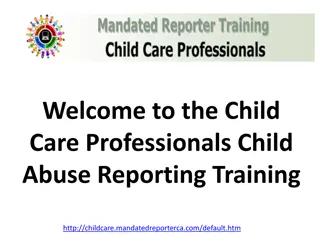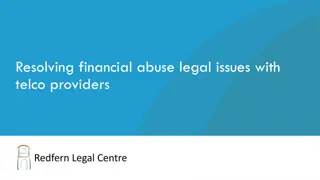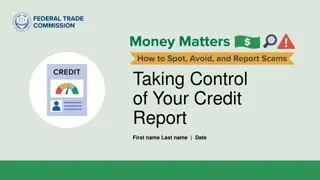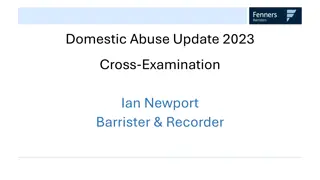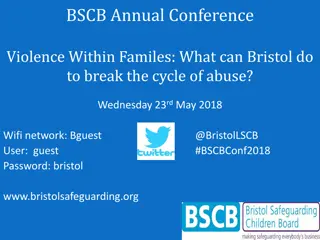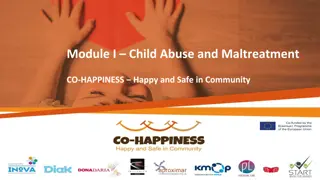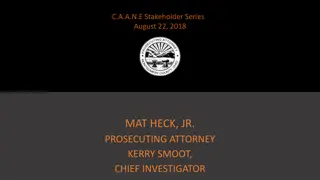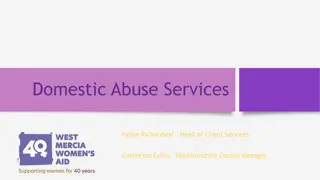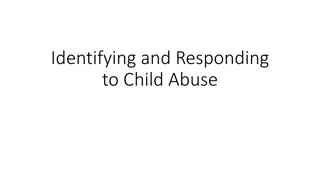Repairing Your Credit Report After Financial Abuse - Essential Steps and Guidance
Financial abuse is a form of domestic violence where money is used to control and manipulate victims. This abuse can have long-lasting effects, especially on credit reports, leading to ongoing financial struggles. Survivors may face challenges in correcting credit report issues, requiring expert guidance and support to rebuild their financial security.
Download Presentation

Please find below an Image/Link to download the presentation.
The content on the website is provided AS IS for your information and personal use only. It may not be sold, licensed, or shared on other websites without obtaining consent from the author.If you encounter any issues during the download, it is possible that the publisher has removed the file from their server.
You are allowed to download the files provided on this website for personal or commercial use, subject to the condition that they are used lawfully. All files are the property of their respective owners.
The content on the website is provided AS IS for your information and personal use only. It may not be sold, licensed, or shared on other websites without obtaining consent from the author.
E N D
Presentation Transcript
Repairing your Credit Report after Financial Abuse April 2023 Amelia Klein Solicitor, Financial Abuse Service NSW, at RLC
Acknowledgement Of Country
Outline 1. What is financial abuse 2. What are credit reports 3. Correcting and repairing common credit report issues after financial abuse 4. Questions RESOURCES: www.rlc.org.au/training/resources/financial-abuse
What is financial abuse
What is financial abuse? Financial or economic abuse is a form of domestic violence where an abuser uses money to gain power and to control their partner. Domestic violence is a pattern of abusive behaviour in an intimate relationship or other type of family relationship where one person assumes a position of power over another and causes fear It is often referred to as a pattern of coercion and control. (1800RESPECT) There is no single agreed legal definition of domestic violence in Australia.
Examples of financial abuse behaviours Joint debts or debt in victim-survivor s name only Partner makes no contribution toward joint debts resulting in financial hardship Person signs documents for a loan or credit card for which the person got no benefit because they were afraid of their partner (e.g. car loan in the name of someone who doesn t hold a licence) Person s partner uses their identity to apply for loans / credit cards online without their consent Person s partner takes out an expensive mobile phone contract in the person s name resulting in financial hardship and disconnection of the person s phone Person s partner fraudulently applies for or takes control of social security benefits in their name, or forces them to apply to withdraw their superannuation early.
Ongoing impacts of financial abuse Doesn't necessarily end with the relationship: consequences of financial abuse can continue for years, especially if the financial abuse has negatively impacted their credit score or eroded their financial security. Survivors can have no choice but to consolidate debts or take out payday loans to cover their living expenses, even years after the relationship.
When will someone seek help? While they are in an abusive relationship When they are making plans to leave Immediately after they have left Many years after the relationship has ended.
Credit reports A credit report is a document which summarises information about loans, credit cards and other credit products in your name. It lists any applications or enquiries for credit that you have made. It will also list: o any defaults with credit providers o court judgements against you o if you have been made bankrupt or entered into a debt agreement. Credit reports in Australia are provided by Experian, illion and Equifax.
What impact does your credit report have? A credit report can be accessed in an application for a mortgage or any other consumer credit loan, a phone plan or utilities account. Some non-consumer credit providers can ask for a copy of a credit report, but you have to consent to this. These include landlords and Buy Now, Pay Later providers. A credit report that is impacted by defaults, missed repayment history and/or numerous enquiries can lead to someone being refused a loan, offered a higher interest rate, or being refused a mobile phone contract.
Where can I get my credit report? There are many paid providers who will provide you with a credit score, or a summary of your credit report. Do not pay for a credit report or credit score. You are entitled to a copy of your credit report for free, every three months. You can request a copy of your credit report from Experian, illion and Equifax, by calling or accessing their websites. You will need to provide 100 points of identity documents. If you are assisting a client to obtain a credit report, you will also need to provide a signed authority. An authority that is signed online is accepted, as long as it is accompanied by the relevant photo identification documents.
Information in a credit report When you check your credit report from any provider, it should include some personal information to confirm the report is about you. It will list current and closed credit accounts, enquiries, defaults, court judgments and information related to bankruptcy. For certain types of current and closed credit accounts, it will show 2 years of repayment history information, and 1 year of financial hardship information. Some information shows up in some credit reports and not others, so it s important to check all three credit report providers.
Questions to ask victim-survivors of financial abuse 1. Are you aware of all of these accounts that are listed? 2. Did you open these accounts willingly and without being pressured? 3. Is the repayment history information accurate? 4. Have you ever asked for financial hardship assistance for any of these accounts? 5. Are you aware of all of the enquiries that are listed? 6. Did you make all of the enquiries yourself, without any pressure? 7. If there are any defaults, what led to this default occurring? 8. Are you aware of any court judgments or other information listed?
Correcting and repairing common credit report issues after financial abuse
Enquiries Each enquiry stays on the report for five years. Multiple enquiries can lead to credit providers seeing you as increased risk. Doesn t show why you didn t proceed, or if you did and closed the account since. Things to consider: Was the enquiry made by you? Was there any error in the enquiry process? Is the enquiry inaccurate?
Enquiries - options Write to each credit report provider to dispute the credit enquiry and ask that it be corrected. Consider alternatives such as No Interest Loans, EPA vouchers and community organisations who may be able to provide assistance without a credit enquiry for future assistance.
Fraudulent and coerced credit products Victim survivors often find details of loans or credit cards they were not aware of when they get their credit reports. Other times they identify they knew about the loan, but it was not for their benefit. You are entitled to obtain copies of documents under the National Credit Law for credit products in your name. After documents have been obtained, can write to the lender and ask for an outcome depending on the circumstances.
Financial hardship information Reported for 12 months, then replaced by positive repayment history information for the following 12 months. If safety risk (eg. joint account with perpetrator), can ask that FHI is not reported. Still unclear how lenders are treating financial hardship information in relation to risk but better than missing a payment.
Repayment history information Repayment history information is displayed in the months in arrears that the payment is. While you are negotiating, you can request that negative repayment history information not be reported, or that there is a stay put in place. Can only be reported if the lender had a right to the repayment.
Credit defaults Very specific circumstances for defaults to be listed. Sometimes lenders send default notices but then do not actually report them on credit reports. Has a significant impact on credit score and remains on credit report for five years. Inability to make payment because of domestic and family violence has been explicitly recognised by OAIC as reason to remove.
Court Judgments, Bankruptcy and Debt Agreements Very difficult to remove from a credit report. Court judgments can sometimes be set aside, but need to get legal advice about the process. Debt agreements and bankruptcy cannot even be removed even if annulled or made void; it will simply be listed as annulled or void rather than removed entirely.
Lilys story Lily s marriage ended in 2017. In 2018, she reached property settlement orders with her ex-partner which involved the sale of the matrimonial home, and she received a portion of the proceeds of approximately $150,000.
Lilys story #2 In 2019 she started a new relationship, with Theodore. She had not decided what she wanted to do with the funds, and was renting an affordable property while she decided the best steps to take financially. Theodore perpetrated financial and physical abuse against Lily over the next 18 months, stealing over $120,000 from her bank accounts. Theodore would take her debit card while she was sleeping, as well as her drivers licence and other documents which allowed him to sign her up for telephone plans and high interest loans without her knowledge or consent. When he accessed her bank account app to take money directly, she would move the money into new accounts and to new banks, but he would obtain that information through threats of and actual violence. She tried to notify the banks of the domestic violence that she was experiencing, but Theodore threatened her and forced her to contact the bank to lift any bans that were in place.
Lilys story #3 After she reported the violence to Police, Lily moved back in with her mother and sought legal advice. Redfern Legal Centre assisted Lily to work with lenders and telecommunications organisations to seek debt waivers and repair Lily s credit report. Lily went back through her emails and records and identified 15 separate enquiries which had been made by her ex-partner which she had not been aware of or consented to.
Lilys story #4 RLC wrote to all three credit report providers, and then subsequently two lenders, as they requested direct contact after we contacted the credit report providers. We also had a default from a telecommunications provider removed by consent with the provider, on the basis of domestic and family violence. Simultaneously, we worked on debt waivers and refunds, and by working on a holistic level, Lily is now in a much better place financially than she was when she left the relationship. However, a default judgment that she has not been able to pay remains on her credit report, as negotiation with that provider has not been successful.
Questions and further resources Amelia Klein Solicitor, Financial Abuse Service NSW Redfern Legal Centre RESOURCES: www.rlc.org.au/training/resources/financial-abuse https://earg.org.au/resources-for-community-workers/
Redfern Legal Centre Credit, Debt & Consumer Law Inner Sydney Tenants Advice & Advocacy Service Employment Law Police & Government Complaints International Student Legal Service NSW Health Justice Partnership Financial Abuse Service NSW
How to contact the Financial Abuse Service NSW 1. Website, including online form: https://rlc.org.au/fas 2. Call: 0481 730 344 3. Email: falsintake@rlc.org.au
Questions and further resources Amelia Klein Solicitor, Financial Abuse Service NSW Redfern Legal Centre RESOURCES: www.rlc.org.au/training/resources/financial-abuse https://earg.org.au/resources-for-community-workers/
Before You Go Your feedback helps us improve our training. Please stay with us for another 30 seconds Training: rlc.org.au/what-we-do/training Enquiries: Nick Manning education@rlc.org.au This webinar is a guide to the law in Australia. It is not a substitute for legal advice. If you have a legal problem, seek legal advice from a legal centre or Legal Aid.
